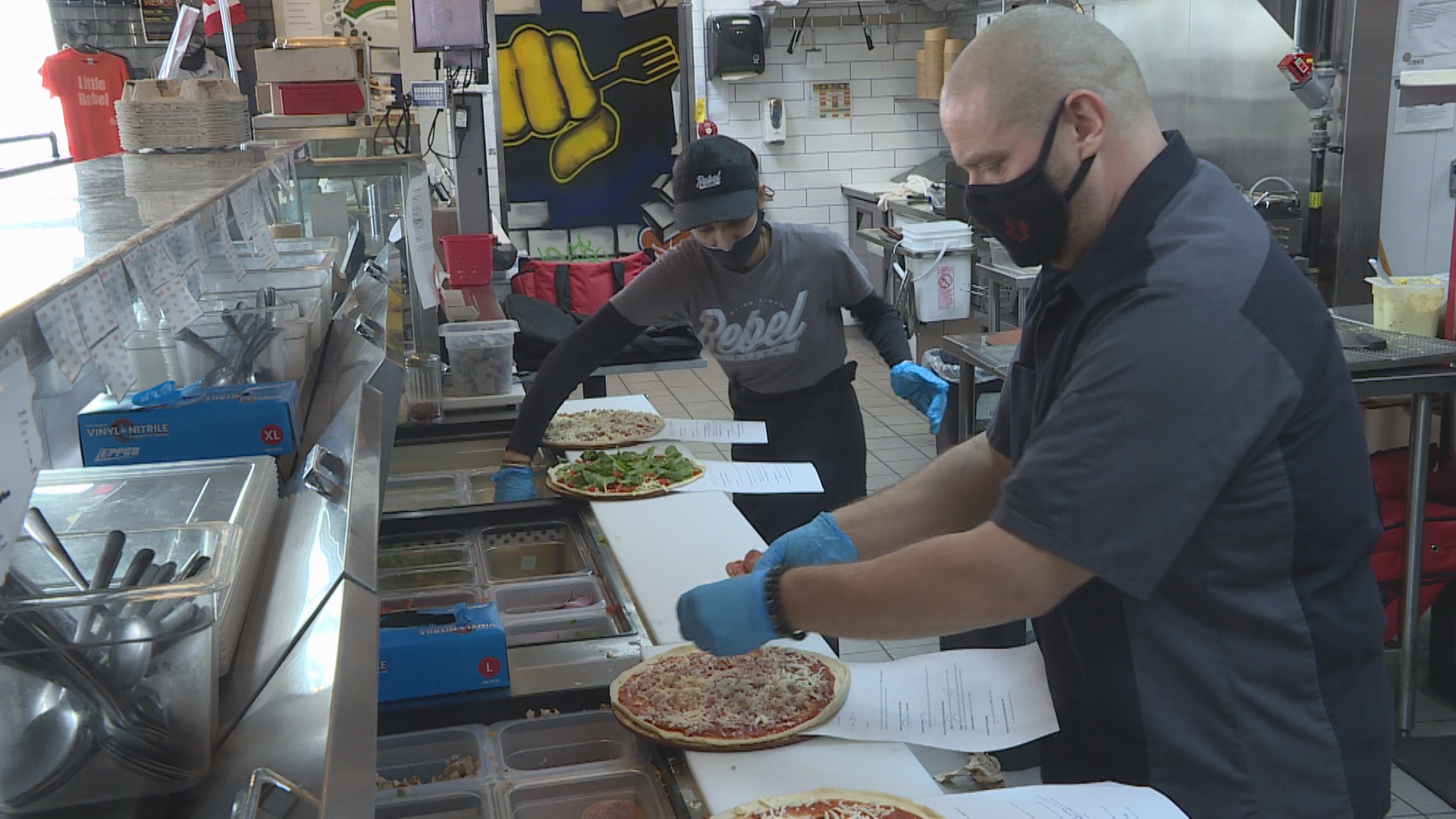COVID-19 restrictions have eased nationwide, yet job vacancies remain high, and nowhere is this more evident than the food services sector.

Recent data from Statistics Canada shows vacancies at the end of 2021 were up 80 per cent over 2019 across all sectors.
But in the food services sector alone, it was up 132 per cent.
It’s an issue Chris Stoneham, co-owner of Rebel Pizza and StrEATS Southdale Kitchen in Winnipeg, is seeing first-hand.
“Sometimes we just either closed early, or opened late, or completely closed that day. We did absolutely cut hours,” said Stoneham, about the challenges of being short-staffed.
“Then you have to answer those questions from customers, like, ‘How come I tried to order and you were open at that hour yesterday but not today?’ But it’s like, sorry, we just don’t have the people to do the service.”
Ideally, Stoneham would like to have 20 employees, but right now he has five.

Get breaking National news
And the slow trickle of job applications isn’t revealing much light at the end of the tunnel.
“Say if you have eight interviews set up that day, you’re lucky to get half of them to even show up for that set appointment,” Stoneham says.
“Then you get into the situation where … they don’t show up for the training or they show up and they give it maybe a day or two and they don’t even call. They just sort of disappear.”
And it’s not an isolated issue, according to Kevin Gill, president of Staffmax Staffing & Recruiting.
“It’s really the whole spectrum,” Gill said.
“We’re finding shortages of people in skilled trades, in hospitality, accounting, finance. IT is very strong, but the front-line retail and hospitality is where the biggest struggle is right now.”
- Bank of Canada holds rates, says policy can’t make up for tariff ‘damage’
- Canada could increase real GDP by 7% if it drops all internal trade barriers: IMF
- Canada deal on Chinese EVs shows trade ‘trumped national security’: experts
- Pizza Pops contaminated with E. coli tied to 7 hospitalizations, data shows
Gill says many people who were without work over the course of the pandemic have taken the time to reevaluate their careers and lifestyle.
“We talked to candidates that don’t go back to their original job to ask them why,” Gill said.
“They said, ‘I took this two years to reflect on what I was doing and I wanted to have more work-life balance. I wanted a job where I could work from home. I wanted a job where I could work evenings or weekends and be off through the day.’
“So it’s the flexibility they wanted, (and) the job satisfaction.”
At the same time, Gill adds, younger people are entering the workforce with more technology skills.
“Nowadays it doesn’t take as much as it used to to learn how to become a programmer or how to become an IT professional,” Gill said.
“Those are the kind of roles I’m seeing younger people go into more and more. Whereas your first job would be in a restaurant or a McDonald’s or so on. (Now), often, they’re taking their first jobs online, with some work-from-home rule with an employer that may or may not be in the city or even the country.”
Shaun Jeffrey, CEO of the Manitoba Restaurants and Food Services Association, says restaurant owners are taking “exceptional” steps to fill all kinds of jobs, including management.
“It’s things we’ve never done before: using specific hiring methods and bonuses and things like hiring agencies. Not very often in the past would the restaurant agency need to use a hiring agency,” Jeffrey told 680 CJOB, adding its been a recurring problem for about the last year.
“Even when we were opening up after the second and third wave of the pandemic closures, a lot of operators weren’t opening up for those lunchtime business or that breakfast business or closing early because of staffing concerns.”
Back inside the pizza shop, Stoneham says he’s not quite sure what to do next.
“We don’t really have the answer. We don’t know what we’re going to do. You just keep plugging away, right?” Stoneham said.
“Our new slogan should be … ‘Rebel Pizza, we’re always hiring,’ or something,” he added with a laugh.










Comments